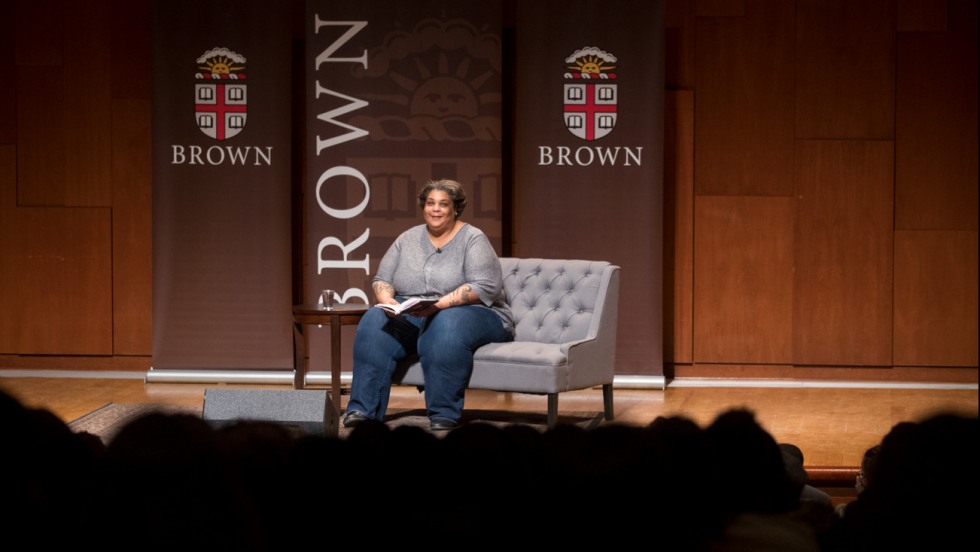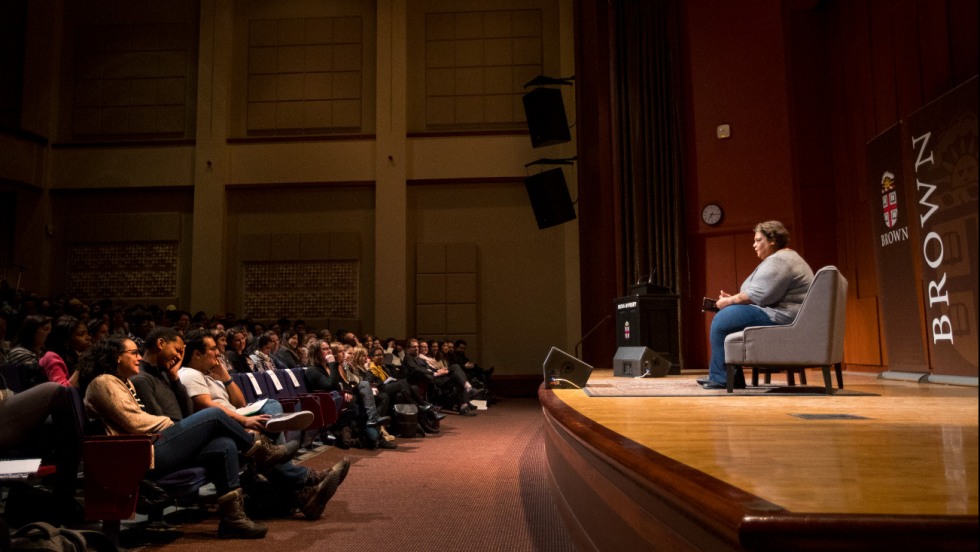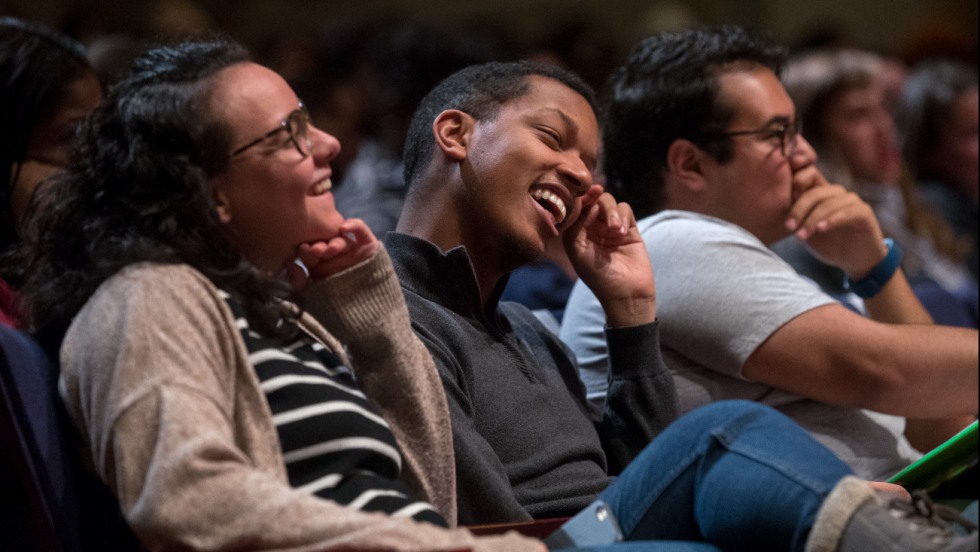PROVIDENCE, R.I. [Brown University] — In a sharp, funny and wide-ranging reading and discussion at Brown University’s De Ciccio Family Auditorium on Feb. 14, writer, scholar and cultural commentator Roxane Gay discussed the reality television show “The Bachelor,” drew attention to the imprecise language that characterized the presidential campaign and urged the crowd to fight for social and economic justice.
Gay, whose visit to Brown was organized by graduate students in the Department of American Studies, read two stories from her collection "Difficult Women" followed by a nonfiction work about waking up on Nov. 9, 2016, and grappling with a new political order.
Gay teaches English at Purdue University and has written novels, short stories, essays and the Marvel comic series "Black Panther: World of Wakanda." She said she thinks of herself primarily as a fiction writer but lately has had “cause to write a lot of nonfiction.”
“I didn’t write a lot about the presidential campaign — I regret that now,” Gay said. “Let us be clear. To call what is currently happening a ‘disgrace’ is my way of being polite,” she added, citing the president’s executive order to build a wall on the U.S.-Mexico border, the effort to dismantle the Affordable Care Act and actions relating to national and international security undertaken “with no regard for actual security.”
“Throughout the campaign, I did think about language, and how careless we got with the words we use,” Gay said. “I thought about words because I’m a writer, and words are how we make sense of the world and how I make sense of myself. There were all kinds of pithy catchphrases that became popular.”
Gay cited the adoption of Michelle Obama’s oft-cited “They go low, we go high,” statement, the use of “nasty woman” by Hillary Clinton supporters as a slogan and “love Trumps hate” as understandable but misguided attempts to find comfort or solidarity.
“Millions of people went on to parrot these words with no understanding of the world and how it really works,” Gay said. “Too many people were and are invested in this idea of purity and infallibility to realize that there can be no purity in fighting fascism. There is no high road with a man who has appointed a white supremacist as his chief strategist in the White House. When they go low we have to be willing to go lower if we have any hope of resisting their greedy, shallow and insular brand of fascism.”
“The phrase ‘loves Trumps hate’ was equally loathsome,” Gay said, “because that is in fact rarely the case and by repeating it over and over, people were literally centering Trump. Language matters because sometimes it becomes an empty container,” for whatever people want to fill it with, she said.
Gay argued for the need to “move beyond tidy words that make us feel like the world is a better, more unified place than it actually is,” and for the need to recognize when phrases are used to duck responsibility or dismiss important issues.
Gay described “diversity” as a word so overused as to become meaningless and “identity politics” as a phrase misused to imply that “we can’t both acknowledge and embrace our identities and be part of a broader community.”
As a woman who is black, bisexual, Haitian-American, and who grew up middle class and then upper middle class, Gay said her identity “is political because so much of who I am is part of the public discourse, subject to legislation, discrimination and disadvantage. Clearly this is not the entirety of my life and who I am, and I’ve got it very good.”
Still, Gay said, she is often invited to speak at events with the vague mandate to discuss diversity, a word that suffers from “overuse, imprecision, inertia and self-serving intentions,” and is expected to offer solutions for making the world a more inclusive place.
The antidote to careless, imprecise language and the problems that language seems to perpetuate is change that arises through intent and effort, Gay said, as well as imagination, willingness to think and act differently and a sustained commitment of material resources.
While Gay said that the work she does is not so much for herself but for marginalized people who lack her privileges and need someone to stand and speak for them, she said she was not advocating for the comfortable distance the notion of being an “ally” connotes, and she urged others to focus their actions on the challenges marginalized people face.
“As marginalized people try to vocalize why a Trump presidency is terrifying, those who don’t get it try to look the other way,” Gay said, “or absolve themselves of how they are complicit in what comes next.”
While Gay was asked, during a long question and answer session, for advice on everything from how to understand different claims of and about feminism by celebrities, what kind of art or writing might be prioritized in tumultuous political times, how to help young students whose identities might be under attack and why a certain contestant is still on “The Bachelor” (the producers’ plant, Gay opined), Gay asserted that she does not know what is coming next and is thinking hard about how to find a way forward.
“I’m thinking about the ways in which we can strengthen ourselves and our communities by understanding where strength among us is most needed,” Gay said. “I’m thinking about how when we use our words, we have to do so with care and intent. I have to believe that we will get through this and not only survive but thrive.”


